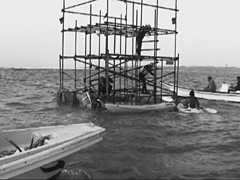Marines Go Home!—Henoko, Maehyang-ri, Yausubetsu
(“Marines Go Home! Henoko, Mehyanni, Yausubetsu”) 2005 / Japanese, Korean / Color / Video / 135 min
2005 / Japanese, Korean / Color / Video / 135 min
Director, Editing: Fujimoto Yukihisa
Photography: Fujimoto Yukihisa, Kodera Takuya, Miyazaki Toshiharu, Nishimaru Eiji
Sound: Kubota Yukio
Narrator, Producer: Kageyama Asako
Production Company: Morino Eigasha
World Sales: Hokkaido Asia Africa Latin America Solidarity Committee (Hokkaido AALA), Morino Eigasha
Both Japan and Korea have U.S. military bases on their soil. Henoko, Okinawa continues a desperate campaign to block the construction of a U.S. Marine Corps heliport. A bombing practice site for the U.S. Air Force exists in Maehyang-ri, Korea. Yausubetsu, Hokkaido has the largest Self-Defense Forces maneuvers training ground in Japan. The film shows us a facet of Japan’s militarization as it follows people in each region engaging in lifelong anti-military protest activity.
[Director’s Statement] I want to break away from the prejudice that documentary is about recording hard, sad realities. To me, documentary filmmaking is about joining people in their search for hope for the future, and recording that process. “Let there be warmth in human society, let there be light in all human beings.” In every age, film depicts hope.
 Fujimoto Yukihisa
Fujimoto Yukihisa
Born 1954 in Yokkaichi, Mie Prefecture, Fujimoto Yukihisa graduated from the School of Political Science and Economics at Waseda University. After working as an assistant director for Tsuchimoto Noriaki, he made his directorial debut with Japanese Invasion of the Malay Peninsula (1992). Mining the Dark won the Second Prize at the 2002 Retina International Film and Video Festival. |
